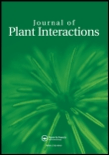
Journal of Plant Interactions
metrics 2024
Sharing Discoveries in Plant Interaction Science
Introduction
The Journal of Plant Interactions, published by Taylor & Francis Ltd in the United Kingdom, serves as a leading open-access platform dedicated to advancing the understanding of plant interactions and their ecological implications. Established in 2005 and transitioning to open access in 2015, this journal focuses on both fundamental and applied aspects of plant interactions, providing invaluable insights for researchers, professionals, and students within the fields of Ecology and Plant Science. With a commendable impact factor and ranked in the second quartile (Q2) for both Ecology, Evolution, Behavior and Systematics and Plant Science, it reflects the quality and relevance of its published research. Researchers aiming to publish innovative studies on plant behavior and ecosystem dynamics will find a welcoming avenue for their work, as the journal is dedicated to fostering open dialogue and sharing knowledge across disciplines.
Metrics 2024
 0.57
0.57 2.60
2.60 3.90
3.90 66
66Metrics History
Rank 2024
Scopus
IF (Web Of Science)
JCI (Web Of Science)
Quartile History
Similar Journals
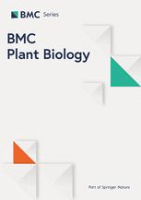
BMC PLANT BIOLOGY
Fostering Global Collaboration in Plant ResearchBMC Plant Biology, published by BMC, is a leading open-access journal devoted to the field of plant science, presenting high-quality research that contributes significantly to the understanding of plant biology. Since its inception in 2001, the journal has established itself as a prominent platform for disseminating innovative research, achieving a commendable Q1 ranking in Plant Science within the 2023 Scopus quartiles, and ranking #39 out of 516 journals in the Agricultural and Biological Sciences category, indicating its substantial impact with a 92nd percentile ranking. Researchers, professionals, and students engaged in the study of plant biology will find a wealth of knowledge in its comprehensive scope, covering critical areas such as molecular biology, genetics, ecology, and biotechnology. The journal's commitment to open access ensures that cutting-edge research is available to a global audience, fostering collaboration and advancement in the field. BMC Plant Biology continues to inspire and facilitate growth in plant-related studies, making it an invaluable resource for anyone interested in the vibrant and essential domain of plant science.

BIOLOGIA PLANTARUM
Pioneering Discoveries in Plant Physiology and GeneticsBIOLOGIA PLANTARUM, esteemed within the realms of horticulture and plant science, is a leading academic journal published by the Academy of Sciences of the Czech Republic, Institute of Experimental Botany. Established in 1959, this journal showcases innovative research and advancements in plant biology, focusing on a spectrum of topics including plant physiology, genetics, and biotechnology. With an impressive Scopus ranking in Horticulture (Rank #41/115) and Plant Science (Rank #221/516), it holds a significant place in the academic community, reflected in its Q2 and Q3 status within its respective categories. Although it is not open access, authors are encouraged to contribute to the growing body of knowledge that supports sustainable practices in agriculture and horticulture. Published in the Netherlands, BIOLOGIA PLANTARUM continues to foster collaboration and dialogue among researchers, professionals, and students dedicated to understanding and advancing plant sciences.

Annual Review of Plant Biology
Synthesis of Cutting-edge Research in Plant BiologyThe Annual Review of Plant Biology, published by Annual Reviews, stands as a premier academic journal dedicated to the comprehensive coverage of significant developments in the field of plant biology. With an impactful presence in the United States and a stellar reputation reflected in its Q1 rankings across multiple categories including Cell Biology, Molecular Biology, Physiology, and Plant Science, this journal consistently ranks among the top within its domain. The journal is particularly esteemed for its synthesis of the latest research findings, making it an invaluable resource for researchers, professionals, and students seeking in-depth insights and advancements in plant biology. Though it does not offer open access, the Annual Review of Plant Biology is essential for those committed to exploring the intricate mechanisms underlying plant function and development, with coverage spanning from 1996 to 2024. As the field continues to evolve, this journal will undoubtedly remain at the forefront, driving innovation and fostering a deeper understanding of plant sciences.

PHYSIOLOGY AND MOLECULAR BIOLOGY OF PLANTS
Pioneering Discoveries in Plant PhysiologyPHYSIOLOGY AND MOLECULAR BIOLOGY OF PLANTS, published by SPRINGER, is a vital journal focused on the advancing field of plant science. Featuring research that spans physiology, molecular biology, and their applications in agriculture, this journal is pivotal for academics, professionals, and students keen on understanding plant processes and enhancing crop production. With an ISSN of 0971-5894 and an E-ISSN of 0974-0430, this journal is recognized for its scholarly significance, ranking in the Q3 category in Molecular Biology, Q2 in Physiology, and Q1 in Plant Science as of 2023. The journal maintains a strong position in the Scopus rankings, with notable percentile rankings including 87th in Plant Science. Established in 2000, this publication aims to foster the dissemination of cutting-edge research by providing a platform for open discussion and knowledge sharing about plant physiology and molecular mechanisms. While it does not currently offer open access options, its comprehensive studies and reviews serve as an essential resource for enhancing our understanding of plant biology.

PROTOPLASMA
Advancing the Frontiers of Cell and Plant SciencePROTOPLASMA is a prestigious academic journal published by Springer Wien, dedicated to advancing knowledge in the fields of Cell Biology, Plant Science, and related areas of Medicine. Established in 1926 and continuing through 2024, this journal boasts a rich history of scholarly contributions and is currently indexed with a notable ranking in various disciplines: it stands in the top quartile (Q1) in Plant Science, the second quartile (Q2) in miscellaneous Medicine, and the third quartile (Q3) in Cell Biology as of 2023. With robust Scopus rankings placing it in the 86th percentile in Plant Science and a solid position in Cell Biology, PROTOPLASMA is recognized for its commitment to high-quality research and innovative findings. Although the journal does not offer open access options, it remains a valuable resource for researchers, professionals, and students seeking to explore the cellular and molecular underpinnings of plant life and its implications in broader biological contexts. Based in Austria, PROTOPLASMA serves as a vital forum for disseminating pioneering research that shapes the future of scientific inquiry in its respective fields.
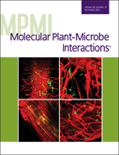
MOLECULAR PLANT-MICROBE INTERACTIONS
Connecting Research and Practice in Plant-Microbe InteractionsMOLECULAR PLANT-MICROBE INTERACTIONS is a premier journal dedicated to the exploration of the complex interactions between plants and microbes, providing a vital platform for researchers in agronomy, crop science, and plant physiology. Published by the American Phytopathological Society, this journal has been serving the academic community since 1988 and continues to be at the forefront of advances in molecular biology and plant-microbe symbiosis, with a notable impact factor reflecting its esteemed position in the field. As a Q1 journal in both Agronomy and Crop Science and Medicine (miscellaneous), and holding a significant ranking in the Scopus categories, it is recognized for publishing high-quality, peer-reviewed research that is essential for understanding and improving agricultural practices. Although it is not an open-access journal, it provides critical insights that facilitate collaborative efforts among researchers, professionals, and students alike. The journal’s objectives focus on enhancing our understanding of plant health, disease resistance, and ecological sustainability, making it a crucial resource for anyone interested in the intricate research landscape of plant-microbe dynamics.
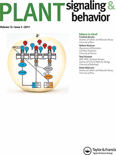
Plant Signaling & Behavior
Bridging Science and Nature: The Language of PlantsPlant Signaling & Behavior is a prestigious journal published by TAYLOR & FRANCIS INC, dedicated to advancing the understanding of the complex signaling mechanisms and behavioral responses of plants. With an ISSN of 1559-2316 and an E-ISSN of 1559-2324, it has firmly established itself in the field of Plant Science, earning a Q1 ranking in the 2023 category quartiles and ranking #83 out of 516 in Agricultural and Biological Sciences, placing it in the 84th percentile according to Scopus metrics. The journal serves as a vital platform for researchers and professionals looking to publish innovative studies and reviews that explore the intricate relationships between plant behavior and environmental signaling. With coverage spanning from 2006 to 2024, Plant Signaling & Behavior not only enhances academic discourse but also supports the growing interdisciplinary nature of plant sciences. Although the journal is not open access, it remains a significant resource for students, researchers, and practitioners aiming to deepen their understanding of plant signaling and its implications for ecology and agricultural practices.

JOURNAL OF PLANT BIOLOGY
Exploring the Depths of Plant BiologyJOURNAL OF PLANT BIOLOGY, published by SPRINGER HEIDELBERG, is a leading academic journal dedicated to advancing the field of plant science. With an impressive impact factor signifying its high citation rate and rigorous peer-review process, this journal ranks in the Q1 category within Plant Science, placing it among the top-tier periodicals in the discipline. Established in 1999, it has become an essential resource for researchers, professionals, and students seeking the latest findings and developments in plant biology. The journal fosters a collaborative environment for sharing innovative research, exploring ecological interactions, and understanding plant physiology, thereby contributing significantly to advancements in sustainable agriculture and environmental conservation. Its high Scopus ranking of 102 out of 516 in the category of Agricultural and Biological Sciences further underscores its relevance and impact within the scientific community. For those interested in cutting-edge research, JOURNAL OF PLANT BIOLOGY is a vital source of knowledge, offering insights that are crucial for the future of plant science.
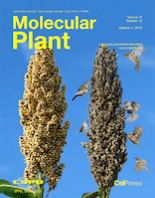
Molecular Plant
Empowering the future of agriculture through molecular understanding.Molecular Plant, published by CELL PRESS, is a premier journal dedicated to advancing the field of molecular biology and plant science. With an impressive impact factor reflecting its rigorous peer-review process and the high quality of its published research, this journal has achieved a remarkable Q1 ranking in both Molecular Biology and Plant Science categories as of 2023. Its Scopus rankings place it within the top echelons of its field, holding 2nd place in Agricultural and Biological Sciences - Plant Science, showcasing its vital role in disseminating impactful research. The journal covers a broad range of topics, including but not limited to, plant genetics, molecular interactions, and biotechnological advances. Research published in Molecular Plant has the potential to significantly influence agricultural practices and biotechnological applications, making it an essential resource for researchers, professionals, and students eager to stay at the forefront of plant research. Access options for the journal are tailored to accommodate a wide audience, facilitating engagement with cutting-edge findings and breakthroughs. As the field of plant science continues to evolve, Molecular Plant remains integral to fostering innovation and collaboration within the scientific community.

JOURNAL OF PLANT BIOCHEMISTRY AND BIOTECHNOLOGY
Transforming Insights into Agricultural InnovationsJOURNAL OF PLANT BIOCHEMISTRY AND BIOTECHNOLOGY, published by SPRINGER INDIA, is a leading publication dedicated to advancing research in the fields of plant biochemistry, biotechnology, agronomy, and crop science. With an ISSN of 0971-7811 and E-ISSN 0974-1275, the journal encompasses a wide range of studies aimed at enhancing our understanding of plant biological processes and their applications in agriculture and biotechnology. It has achieved a noteworthy Q2 ranking in Agronomy and Crop Science and Plant Science, as well as a Q3 ranking in Biotechnology, reflecting its quality and relevance in contemporary research. Notably, the journal ranks #166 in Plant Science and #133 in Agronomy, both falling in the top 67th percentile. With a rich history spanning from 1992 to 2024, the journal is committed to providing open access to innovative research findings that bridge the gap between laboratory discoveries and their practical applications in sustainable agriculture. Researchers, professionals, and students will find a wealth of knowledge and inspiration to advance their work in the dynamic field of plant sciences at this esteemed journal.